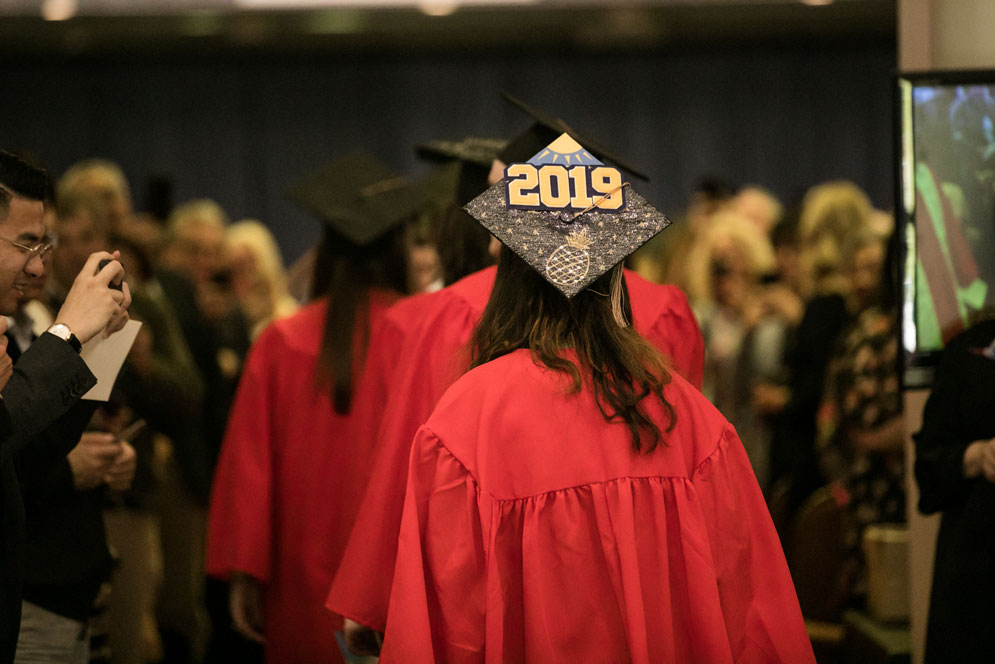Job-Hunting: Now Is Good Time for 2019 Graduates, if You’re Flexible
Employers say specific degrees less important than candidates’ tools and skills

Photo by Dan Aguirre
With several internships under her belt and a degree in public relations from Boston University in hand, Cristina Bartoletti never imagined she’d still be applying for jobs weeks after graduation, and doing it from her childhood bedroom in Charlton, Mass.
Bartoletti (COM’19) seems to be on the cusp of landing a PR gig, juggling interviews, sometimes even two in a single day. But this place between college graduation and finding work has left her wondering if she should have taken her old summer position as a banquet server while continuing her job search.
“It’s a weird limbo,” Bartoletti says on a quiet afternoon.

Straddling the transition from college to a job is never easy, but most experts say it’s a good, if not great, time to be on the job hunt, especially for young workers whose skills can easily pivot from one department or division to another. Barring economic damage inflicted by a potential trade war with China, the US economy is humming, and unemployment is at its lowest level in almost 50 years.
“Right now is probably the best time in over a decade to be looking for a job,” says Kevin Lang, a College of Arts & Sciences professor of economics.
The data back that up.
- According to the Collegiate Employment Research Institute at Michigan State University, hiring of recent graduates with a bachelor’s degree is expected to be up more than 8 percent this year over last year. Its annual survey of more than 1,000 employer recruiters or hiring managers filling full-time positions found that average starting salaries in occupations across the board are expected to rise about 4 percent over last year.
- The institute found that 93 percent of the 2,560 employers it surveyed described the overall college market as “good to excellent,” the best outlook since the bottom of the Great Recession in 2009 and the highest level of optimism in the labor market since the late 1990s.
- Turnover was cited by 61 percent of employers as “quite” to “very” important in shaping their hiring decisions. Growth was strongest in the administrative services, finance and insurance services, professional, business, and scientific services, and real estate and leasing, among others.
- An analysis of census data of 22-to-27-year-olds published in Harvard Business Review found that new graduates are five times as likely to be advertising and promotions managers, actuaries, news reporters, and law clerks, compared to the general population. They’re also disproportionately likely to be financial and credit analysts, geological engineers, and agricultural scientists.
Lang says he advises students to take career routes that require a broad set of skills, because the job market can change quickly as technology advances and companies will need workers able to transition into new roles with new responsibilities. Jobs that once seemed secure, like bookkeeping, are not, he says, so workers need to be prepared for career shifts; he also sees a growing need for workers with a liberal arts education and excellent social skills.
“Especially when you’re young, not specializing too much is a good idea,” Lang says.
That was supported by a recent study from the Association of American Colleges & Universities, which found that employers had decreased their focus on academic majors in favor of job candidates who “demonstrated capacity to think critically, communicate clearly, and solve complex problems.”
Of course there are still challenges. The Economic Policy Institute’s research on job prospects for college graduates found that while this year’s class has better prospects than those who graduated in the immediate aftermath of the Great Recession, many recent graduates will take jobs that don’t require a college degree. It also found worsening wage gaps among women and black workers and high levels of student debt.
Grace Lee (Sargent’19) who majored in health science, says many of her friends are pushing to find work before their student loan bills begin rolling in. In the weeks leading up to graduation, she and her BU classmates shared detailed spreadsheets listing employers they’ve contacted, interviewed with, and even been rejected by to support one another in their search.
“A lot of people are stressed out,” Lee says. “Especially students with debt.”
College debt looms large. According to the Federal Reserve System, for the first time in US history, total student loan debt exceeds $1.5 trillion, more than both auto loan and credit card debt.
Ellen Ruppel Shell, a College of Communication professor of journalism, author of the 2018 book The Job: Work and Its Future in a Time of Radical Change, thinks students are experiencing more trepidation as they go into the labor market, prompting them to take jobs they are overqualified for, like barista or Uber driver at a time when college can’t guarantee well-paid work.
The Federal Reserve Bank of New York has calculated that more than 40 percent of recent college graduates in the United States are underemployed, or working in jobs that do not require a degree. That number drops to 32 percent for all graduates, ages 22 to 65.
“This is very, very scary to college students,” Shell says. “That’s the reality they’re faced with. As faculty, that’s what we have to respect and deal with and grapple with.”
The Federal Reserve Bank of San Francisco has noted that earning a four-year degree remains a worthwhile investment for the average student. The average college graduate paying annual tuition of about $20,000 can recoup the costs of schooling by age 40.
That is cold comfort for those who are plunging into the job market for the first time, like international relations major Luciano Cesta (CAS’19), who says he’s anxiously looking for a job while waiting for a special work permit from the US government that will allow him to remain in the United States.
The Canadian citizen says he may return to school for an advanced degree one day, but for now he’s interested in a job as a research assistant or at a think tank.
“I want to find a job that will either allow me to be self-sustained or a job that will lead to a job that will allow me to support myself,” Cesta says. “Finding a job that both pays well and I’m satisfied with is a challenge.”
Lou Gaglini, executive director of BU’s Center for Career Development, urges a mix of patience and persistence. The most recent data found that 67 percent of Class of 2017 graduates were working full-time, 8 percent were still seeking work, and 19 percent were attending graduate or professional school in the seven months following graduation.
Gaglini says students often come to him concerned that they’re starting their job hunt too late following graduation, even though that’s when about half of the Class of 2019 is beginning the job hunt.
“You’re still in a good place,” Gaglini tells students. “What’s really important is that you’re making positive progress and moving in the right direction.”
Comments & Discussion
Boston University moderates comments to facilitate an informed, substantive, civil conversation. Abusive, profane, self-promotional, misleading, incoherent or off-topic comments will be rejected. Moderators are staffed during regular business hours (EST) and can only accept comments written in English. Statistics or facts must include a citation or a link to the citation.